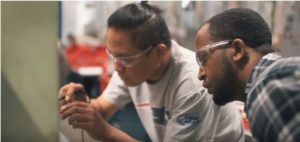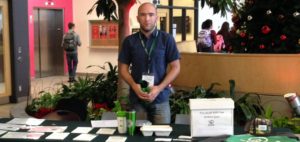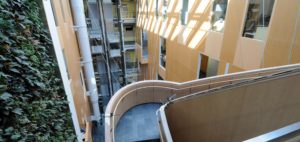Ten Years of Solid Sustainability Performance
In November 2017, Algonquin College reflected on the ten years since it signed the Talloires Declaration on November 23, 2007. The following is a series of four weekly articles published on Algonquin College’s internal communications platform.
Algonquin College and the Talloires Declaration: 10 years of sustainability
 “Sustainable development is development that meets the needs of the present without compromising the ability of future generations to meet their own needs.”
“Sustainable development is development that meets the needs of the present without compromising the ability of future generations to meet their own needs.”
– Brundtland Commission 1987
That definition guides Algonquin College’s efforts to integrate sustainability in all that we do. We are Caring Today, For Tomorrow as we work towards a more sustainable future.
In November 2007, we took one of our biggest steps in this direction. We became the first Canadian college to sign the Talloires Declaration, an international agreement between postsecondary officials. Four colleges across Canada have since signed. The Talloires Declaration is a 10-point action plan to incorporate sustainability and environmental literacy in teaching, research, operations, and outreach. Some of these action points include:
• “Create programs to develop the capability of . . . faculty to teach environmental literacy to all undergraduate, graduate, and professional school students.”
• “Set an example of environmental responsibility by establishing programs of resource conservation, recycling, and waste reduction.”
Over the past 10 years, we have taken action to demonstrate our commitment to a more sustainable Algonquin College. In 2009, we signed the CICan Pan Canadian Protocol for Sustainability. We have embedded sustainability into the curriculum of all of our Ontario College Certificate programs by ensuring that each one includes an identified sustainability-related Vocational Learning Outcome (VLO). Additionally, we have created specific programs that focus on sustainability topics, such as the Green Architecture Graduate Certificate program, and the Bachelor of Building Science program.
We understand that making a commitment to sustainability involves a large spectrum of considerations. This is why we have involved members of all Algonquin College communities, including students, faculty and employees. For example, our Sustainability Toolkit is a website dedicated to providing free training, tools, and resources to employees on sustainability. These resources, as well as elearning programs for students facilitate the process of integrating sustainability into the operations and culture of the College.
Continuing to deliver on our commitments to sustainability is a real measure of our core values: caring, learning integrity and respect. One of our goals in the 2017-2022 Strategic Planis to enhance Algonquin College’s global impact and community social responsibility. Furthermore, we aim to become carbon neutral and to serve as a leader in the education, research and exchange of environmentally sustainable practices. We plan on doing so by expanding our sustainable business practices, working to restore and regenerate our environments, and establishing an international centre for energy management.
For the next month, we will be celebrating the 10th anniversary of the College’s signing of the Talloires Declaration. Each Thursday, we will be posting a story about a member of our community that is fulfilling our mission to build a more sustainable future. We will be providing insight into sustainability initiatives and learning on campus such as our Energy Savings Contract (ESCO) with Siemens, the AC Green Team, and our LEED® Platinum certified Algonquin Centre for Construction Excellence.
We hope that you follow our stories this month and that they inspire you to further integrate sustainability practices on campus and in your personal lives. We all have a part to play in building a more sustainable future.
An AC Green leader: Talloires Declaration 10th anniversary
 This month, we continue to celebrate the 10th anniversary of the College’s signing of the Talloires Declaration, an international agreement on sustainability between postsecondary officials. Last Thursday we provided an overview of the Declaration. This week we are featuring an Algonquin College student that fully supports the direction to build a more sustainable future.
This month, we continue to celebrate the 10th anniversary of the College’s signing of the Talloires Declaration, an international agreement on sustainability between postsecondary officials. Last Thursday we provided an overview of the Declaration. This week we are featuring an Algonquin College student that fully supports the direction to build a more sustainable future.
Meet Jason Juurlink, an outdoor enthusiast, environmentalist – and devoted AC Green Team leader. Juurlink is a third-year student in the Bachelor of Building Science program. Prior to attending Algonquin College, Juurlink earned a diploma in Green Building and Renewable Energy and worked for five years in the industry. When asked why he decided to return to the classroom, he said that the College’s program offered the exact classes to match his interests.
Canada’s first Bachelor of Building Science program was introduced in the fall of 2013. It embodies many of the 10 action points outlined in the Talloires Declaration such as, “Establish programs to produce expertise in environmental management, sustainable economic development, population, and related fields to ensure that… graduates are environmentally literate and have the awareness and understanding to be ecologically responsible citizens.” This theoretical and applied program was designed to bridge all facets of building design, construction, human comfort, and sustainability.
“Normally, students that are interested in this program are also interested in the environment,” says Bachelor of Building Science program coordinator Maria Parra. That fits Juurlink to a tee. He is committed to learning about environmental sustainability – not only through the choice of his program, but also through his actions on campus. For two years, Juurlink was an AC Green Team leader. This involved sharing sustainability practices with peers at Algonquin College. He regularly worked a booth on campus to engage students in sustainability learning through games or quizzes they created. They educated students on tangible sustainability practices such as waste reduction strategies by reusing cutlery and bringing their own thermos or water bottles to campus.
Juurlink spent a summer working on waste management issues within the Physical Resource team at Algonquin College. In this position, he worked on evaluating the waste and recycling bins on campus and examined best practices at other institutions to explore what we can do to improve waste diversion of recyclable material.
If you’re not already convinced that Juurlink is a natural green leader, then keep reading. He completed the Student Leadership Program, which involves 5 leadership workshops and 18 community volunteer hours. He encourages students that want to be more involved in sustainability practices on campus to first educate themselves about global warming and then ask sustainability-related questions to their professors. He hopes that more students will join the AC Green Team.
No matter the program, industry, or discipline, Juurlink believes professors can engage their students on sustainability-related topics. Through his actions, Juurlink personifies Algonquin’s four-word approach to incorporating sustainability in all areas of the College: Caring Today, For Tomorrow.
Ten-year milestone: Algonquin College and the Talloires Declaration
 On November 23, 2007, Algonquin College became the first college in Canada to sign the Talloires Declaration, an international agreement on sustainability between postsecondary officials. The declaration includes a 10-point action plan to incorporate sustainability and environmental literacy in teaching, research, operations, and outreach. On the 10th anniversary of the historic signing, we would like to highlight some of the numerous programs, projects, and initiatives that have taken place at Algonquin College as a result.
On November 23, 2007, Algonquin College became the first college in Canada to sign the Talloires Declaration, an international agreement on sustainability between postsecondary officials. The declaration includes a 10-point action plan to incorporate sustainability and environmental literacy in teaching, research, operations, and outreach. On the 10th anniversary of the historic signing, we would like to highlight some of the numerous programs, projects, and initiatives that have taken place at Algonquin College as a result.
At the same time of the Talloires signing, members of the college community assembled as a grassroots environmental committee (and later formally recognized by the college executive team as the Sustainable Algonquin Steering Committee (SASC) ) which undertook an extensive process involving members of our community – as well as outside experts and partners – to determine how to apply the Social-Economic-Environmental (S-E-E) model within the College community. This led to the creation of our Sustainability Strategy Framework. This framework reflects the notion of a balanced and equal weighting of social, economic, and environmental needs and serves to guide all of our decision-making processes. Within the framework, are nine goals across the three S-E-E pillars of sustainability. The three leading goal statements are in areas of:
• Social: Enhance Student Success
• Economic: Institutionalize sustainability
• Environmental: Reduce our ecological footprint
Now, let’s take a closer look at the many ways the College is living up to its commitment to sustainability. During the 2012-2013 academic year, over 15 programs and courses were involved in piloting the process of embedding sustainability and internationalization as a new Vocational Learning Outcome in Ontario Credential programs. Among those was the Hairstyling program. Since the new AC Salon opened in 2014, it has been operating as a Green Circle Salon. Students now actively learn and are evaluated on how salon and spa operations impact the environment, and how they can make positive changes through their recycling procedures, product choices, and connections with the community.
In the fall of 2011, we officially opened our LEED® Platinum certified Algonquin Centre for Construction Excellence. Students from all trades programs come together to work collaboratively in this building that serves as a prime example of sustainability. The building’s green roof, along with our five-storey bio wall made up of living plants are clear manifestations of sustainability that set the building apart. The design of this building was a huge undertaking in order to meet the requirements of gaining the Leadership in Energy and Environmental (LEED) Platinum certification. The selection of building materials water and energy efficiency, support for sustainable transportation, and a myriad of other design considerations all contribute to the building’s sustainability rating. “It was important that the whole team was aligned with the process to ensure we didn’t treat sustainability,or LEED, as a separate layer on top of our traditional approach,” recalls Phil Rouble, Associate Director, Facilities Planning and Sustainability. We are proud that our Ottawa campus is home to one of Canada’s largest LEED Platinum buildings.
In 2014, we launched our ESCO2 project with Siemens Canada. This innovative Energy Savings Contract (ESCO) is a multi-year initiative that focuses on better energy performance on our Ottawa campus. Outcomes of this project over the next 20 years will include producing fewer greenhouse gas emissions, using less energy, and water, and cutting our non-critical maintenance debt by up to one half.
We understand that everyone has a role to play in a more sustainable future and student involvement in this journey is a key factor to our continued progress. This is why the Sustainable Algonquin Steering Committee (SASC) has created the “22-4” Student Sustainability Leader Award. This award recognizes students who volunteer their time to create positive social and environmental change and demonstrate their commitment to sustainability.
As we celebrate the College’s Talloires Declaration milestone, we would like not only to look back on what we have accomplished, but also look forward to our next 10 years. One of the goals in our 2017-2022 Strategic Plan is to enhance Algonquin’s global impact and community social responsibility. To deliver on this commitment, we will be expanding our sustainable business practices, and initiating work towards a long term goal of carbon neutrality. For more information on sustainability-related initiatives on campus, Visit the Sustainable Algonquin website here.
At Algonquin College, we are proud to be among the many organizations that are taking responsibility for the social, environmental, and economic well-being of our planet. We hope that you join us in embedding sustainability into everything we do, and making the next decade even more impactful than the last.
Food Services serves up sustainability: Talloires Declaration 10th Anniversary
 Algonquin College’s Food Services has developed a taste for sustainability.
Algonquin College’s Food Services has developed a taste for sustainability.
In celebration of the 10th anniversary of the College signing of the Talloires Declaration, an international agreement on sustainability between postsecondary officials, we have been highlighting sustainability-related stories on campus. Today we wrap up the series with a glimpse into how Food Services is integrating sustainability into its business practices. There are multiple ways that our daily food purchases on campus contribute to a more sustainable future. Let’s take a closer look.
First, the College has fully eliminated the use of Styrofoam products in all of our Food Services locations. Alternatively, we use compostable cups and containers. Our napkins are also biodegradable along with the soap we use to clean dishes on campus. The Fix Eatery in ACCE building collects our compostable organic waste and transfers it to green bins that are picked up by our contracted waste hauler, Waste Management for off-site, industrial composting.
A popular initiative on campus has been our reusable mug incentive, in which customers bring their own mugs to receive a discount on their drinks. We were thrilled that almost 10,000 customers took advantage of this incentive in the 2015-2016 school year. It is no secret that our staff, students, and employees are coffee lovers. That’s why we carry organic coffee that holds the Rainforest Alliance Seal. This seal demonstrates that a farm, forest, or tourism enterprise has been audited to meet environmental, social, and economic sustainability standards.
This week, we speak to Mary Baxter, General Manager, Food & Conference Services at Algonquin College. Baxter provides insight on how a provincial-level pilot project on local food procurement is further improving our sustainability practices on campus. Algonquin is one of three colleges participating in the initiative, which will I inform the development of a local food procurement model for all Ontario colleges. The project allowed Algonquin College Food Services to develop and expand their relationships with local food suppliers. Throughout the summer, Food Services had local vendors come onto campus to sample their product, and featured a local Vendor of the week. One of the most successful events hosted during this project was the College’s first Farm to Campus – Harvest Lunch. Many of our local food suppliers were invited to the Harvest Lunch where they had the opportunity to join students and staff for the afternoon. This was a great moment for the community to connect and enjoy a locally-sourced meal.
For eight weeks, Algonquin College ran a seasonal menu that featured a variety of locally sourced ingredients in meals, soups and the salad bar served in Marketplace Food Court, 35th Street Café, Portable Feast and Bits and Bites. Baxter highlighted the importance of seasonality when it comes to locally-grown foods.
“There has to be real ebb and flow and flexibility with your menus so you can take advantage of what’s available,” Baxter says. “It’s not like going to the grocery store where there’s everything. You need someone in the kitchen that has the skillset to really move with what’s in season and what’s available, and our executive chef, Russell Weir is fantastic for that.”
On campus, the College buys the seasonally-available local ingredients in bulk. Good examples are our strawberries and raspberries for our ‘Sweet Spot’ vendor in the Marketplace Food Court, or the garlic used in our kitchens, which comes from Silver Springs Farms. (For a list of our 17 local food providers, visit here.)
Algonquin College is unique in that it has the only self-operated kitchen at all of Ontario’s 24 Colleges, allowing most food production to happen on campus. As a self-operated food service, reduced food and packaging waste is under our control and practices such as having a local butcher who can ensure that we use every part of an animal efficiently is another step to minimize waste.
To Baxter, local means including those within the community and being transparent about the transportation impact of your food. It means balancing the needs and the wants of your customers with what is available in season while keeping the process of delivery sustainable. It also means supporting the local food economy. With the College’s buying power supporting local farmers, there is the potential for more jobs for graduates of the Horticultural Industries and business programs.
The College is proud to help shape the Ontario’s first local food procurement model for colleges. The final framework will be released in early 2018.
Baxter has shown us how Food Services is embracing Algonquin’s four-word approach to incorporating sustainability in all areas of the College: Caring Today, For Tomorrow.
With a decade under the Talloires Declaration, our campuses are serving up sustainability.